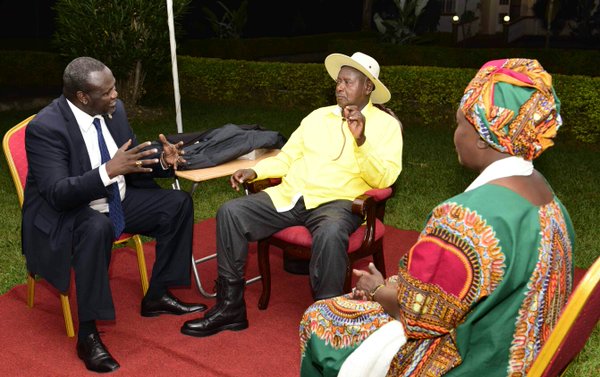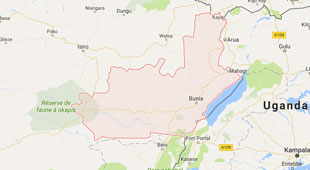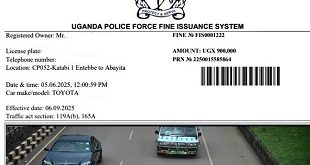Juba, South Sudan | AFP
On a dusty patch of earth cut into thick bush on the outskirts of South Sudan’s capital, hundreds of rebel soldiers who took part in a more than two-year civil war have set up a new base.
The camp is basic: a few blue tents in the baking heat, piles of cut grass to build thatch hut shelters, pit latrines and a few leaky water taps.
Here lies the best hope yet to end a brutal civil war that saw the world’s youngest nation spiral into catastrophe and pushed to the brink of famine, with tens of thousands killed, over two million forced to flee their homes, and multiple ceasefires shattered.
The camp, one of three in Juba, has no visible defensive positions or walls — and the rebels are edgy with all sides still heavily armed.
Rebel general John Mabieh Garr points towards a nearby government army base.
“(It) would be better if they stay distant from us, until we know the reality of the peace agreement,” he mutters.
The risks are great and the stakes high.

Significant step
The 1,370-strong armed rebel force completed their arrival into Juba last week as part of a long-delayed August 2015 peace deal, a prelude to rebel chief Riek Machar’s expected return on April 18.
Machar, who fled during the massacres that erupted in December 2013 when war broke out in Juba, is set to take up the post of vice-president — the same job he was sacked from months before conflict erupted — and form a unity government with arch-rival President Salva Kiir.
“When Machar returns, it will allow the formation of the transitional government, the most significant step in the implementation of the peace agreement,” said Casie Copeland from the International Crisis Group (ICG) think tank.
While Machar’s arrival will be a major symbolic step forward, many warn that practical implementation of the peace deal will be a long and tough task.
There are other rebel forces still fighting who are not included in the peace agreement.
“Machar’s arrival to Juba will mean the peace agreement is now on the right path,” said civil society leader Edmund Yakani, directer of South Sudan’s Community Empowerment for Progress Organization (CEPO). “But it does not mean the country is free from violence.”
No panacea
The conflict now involves multiple militia forces driven by local agendas or revenge, who pay little heed to paper peace deals.
“There are many questions as to the feasibility of the arrangement,” said David Deng from the South Sudan Law Society (SSLS).
Even the usually upbeat Festus Mogae, a former Botswanan president heading the international ceasefire monitoring team, has warned that the “formation of a new government will not in itself be a panacea.”
ICG’s Copeland warned Machar’s arrival would be only one step in a “messy peace”, but that crucially it is backed by regional nations, putting pressure on the leaders to make the deal work.
Tensions remain deep, with the rebels accusing the army of boosting troops in the capital, which should be officially demilitarised within a 25 kilometre (15 mile) radius apart from units allowed under an August 2015 peace deal. The army denies the claims.
Violent kleptocratic system
Both Kiir and Machar are former rebel leaders who rose to power during Sudan’s 1983-2005 civil war between north and south — a war in which the men also fought each other — before South Sudan won freedom in 2011.
They come from the south’s two main ethnic groups — Kiir from the Dinka people and Machar from the Nuer — tribes that are themselves split into multiple, and sometimes rival, clans.
Civil war broke out in December 2013 when Kiir accused Machar of planning a coup, setting off a cycle of retaliatory killings that have split the poverty-stricken, landlocked country along ethnic lines.
Today the country is close to collapse with soaring inflation, oil production cut due to war and the income earned from it a fraction amid a slump in global prices.
“Unless the violent kleptocratic system that underlies the war and mass corruption is addressed, no temporary unity government will be able to end the war and associated atrocities,” said John Prendergast from the Enough Project campaign group.
“This conflict was in many ways driven by competition over the spoils of state control. Unless there are serious consequences for mass corruption and atrocities, the deadly status quo is likely to continue.”
Juba saw some of the worst atrocities in the first weeks of war, but since then has been largely calm. With armed factions now inside the city, people are nervous.
“People are clearly worried,” said Deng. “But people are also hungry for peace, and this agreement is, in reality, the only path towards that… so people are willing to accept the risk in the hope it will pay off.”
 The Independent Uganda: You get the Truth we Pay the Price
The Independent Uganda: You get the Truth we Pay the Price



